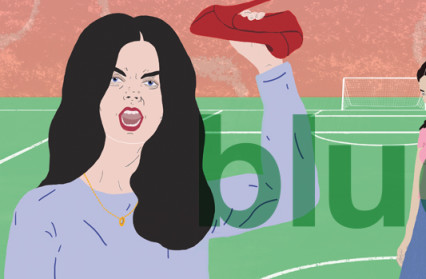Emily Garside casts a critical eye over The Other Room’s production of Blud, a play written by Kelly Jones.
Blud is the latest offering from Cardiff’s smallest theatre ‘The Other Room’ at Porters. The perfect venue for this One Act two-hander, the audience feels as though they’re sitting in the cramped old locker room with the characters. Written by Kelly Jones, winner of the 2014 Wales Drama Award, Blud is an excellently written witty piece of drama with a dark and serious undertone.
There is a dire need for more working-class voices in our theatre – from those involved in production, to the stories depicted on stage and it was refreshing to see a play focused on working-class characters that gave them real agency instead of caricature. Using the outline of football rivalry and girl-gangs alongside the narrative of two sisters raised apart by the care system. Giving a genuine voice and rounded character, as well as considering the experience of people from a working-class background is a real step forward for theatre and makes Blud an important play.
The approach of the play is engaging, beginning with a monologue from Francesca Marie Claire’s character Rita that draws on spoken word poetry traditions and sets the scene. The arrival of Olivia Elsden as Lou allows for an often comedic back and fore between the characters which is expertly timed. The writing really brings the characters to life, while comic it reflects realistic speech patterns and also expertly brings out the age difference between the characters through their phrasing.
The story is part coming of age for not just the younger character Lou but for Rita as well – along with a reflection on the nature of family. Against the backdrop of girl gangs and football rivalry is the main ‘family’ that Rita aligns herself with and her conflict with her ‘real’ family as Lou tries to become part of her life. There is a sadness and loneliness to Rita’s character as she desperately tries to get her ‘Girls’ to come to the locker room and help her with her fight against a rival. The devotion and desperation with which she is devoted to her football team also belies the need for Rita to feel a part of something, less isolated. Alongside this is a conflict; Lou feels being abandoned by her ‘real’ family – by their Mother and by Rita as she reaches out. Lou’s actions that lead her to come to Rita actually reflect the same desires Rita shows in her football and gang devotion. This questions the dynamics between the characters, their shared history, and the situation they find themselves in – united again due to Rita’s actions – and raises the questions of ties of family or ‘blud’.
Blud isn’t a sweetly rounded analysis of family love and life winning out. Quite the opposite in fact, there is a dark backdrop to the girls’ history that the audience only glimpses, and the actions that seem to bring them together in the end certainly have a dark undertone. But this only reinforces the idea that Blud presents – that ideas of family come in different forms, and that it’s not always an easy ride.
Blud is a witty and powerful piece of drama that goes against the traditional ideas of how we talk about family. It’s also giving important voice to those we rarely hear from in theatre as fully formed focal points of drama.
The piece is slickly performed by both actresses, a challenging piece to perform dependent on rhythms of speech and rhythm between the characters. Their relationship is real and believable with a sense of heart and urgency. Anna Poole’s direction makes the most of both the actor’s strong abilities and the small space. There is a subtlety to the direction that suits both the dialogue of the piece and the staging. A particularly effective addition to the piece is the soundscape designed by Chris Young, which gives a real sense of the world outside the room we’re in and really shows what clever use of sound and staging can do in a small space.
Blud is a strong piece of writing brought to life by a talented team. The power of a small piece in a small room is a testament to all involved including The Other Room team which is going from strength to strength.
To find out more about upcoming productions from The Other Room visit their website.
Emily Garside is a writer, an active member of the Cardiff theatre community, and a contributor to Wales Arts Review.












